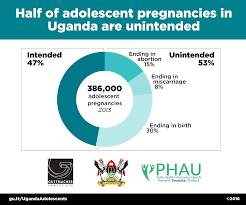Gender Transformative Approach to Slowing Population Growth in Uganda
Aug 12th, 2019 | By admin | Category: Family PlanningBy Joshua Mirondo, youth writer for Transition Earth.
Uganda is at risk of having adverse gender, human rights and environment effects because of its high population growth rate.There is an annual increase of 3.3 percent, which is one of the fastest in Africa – and the whole world. Since the majority of Uganda’s population is young people under the age of 30, this puts them at high risk of many sexual and reproductive health issues.
One of the major contributors of Uganda’s rapid population growth rate is teenage sex. Girls often start having sexual relations at the age of 14. This greatly increases their chance of becoming teen mothers – children having children. Many of them do not have information that can help them understand how to behave as a teenager because society has tagged sexual and reproductive health (SRH)as immoral. Some of them are forced into marriage upon realizing that they are pregnant, as their families do not want to have “shame” brought on them.
According to Family Planning 2020, approximately half of all pregnancies among women aged 15–19 in Uganda are unintended, totaling an estimated 214,000 unintended pregnancies each year.
Data compiled by the Guttmacher Institute indicate that annually, it would cost $2.19 per capita to fully meet adolescent women’s needs for both modern contraception and maternal and newborn care in Uganda ($0.44 per capita on modern contraception and $1.75 on maternal and newborn care).
In many cultures, it is regarded as a parent’s irresponsibility if a girl gets pregnant before marriage. Some religions also believe that if a girl starts menstruating, they are fit for marriage. A woman, therefore, ends up having an average of eight or more children in her lifetime, which is often too many children for them to handle.
Burden to government
Uganda is a third world country that depends entirely on borrowing and donor funds. Having a huge population subjects it to intensive borrowing by the national government in a bid to set up social services for the population that depends upon it. Public schools are completely full, and some students do not have places to sit in classrooms; yet they understandably want to access free education. Government health centers are short of both human and medical resources, where there is a ratio of 1 doctor to 100 patients.
Uganda also does not have a strict population policy that places limits on the number of children that people can have. However, it gives them the liberty to have as many children as they want, as long as they can care for them. Many people assume that they can look after huge numbers of children, but a few years later many are crying out to the government, seeking support. If they don’t receive help, they blame the government for abandoning their children.
Pressure on Natural Resources
Uganda is experiencing climatic changes and this is as a result of pressure exerted on the natural resources. Forests are being cleared and swamps drained by people looking for a place to settle. Both local and foreign investors have also used this as an opportunity, since they have a ready market for their produce. This has resulted in stress on natural resources, where water levels in lakes are decreasing and hazards like landslides are increasing, since the ground cannot sustain a high population. On rainy days, all urban centers are flooded with water, since the swamps that act as water catchment areas have been drained, and the water finds its way into people’s homes. Many lives have been lost because of these serious environmental issues.
Engaging menChildren are a sign of prestige in many African cultures, and Uganda is no different. Since time immemorial, men boasted of having many children and the more one had, the more respect was accorded. This forced – and has continued forcing men – to have more children than they can afford to take care of. Some of them give reasons for having many children, such as leaving a legacy after they die, so there are descendants to represent them and the family. My grandfather had over 11 children and when asked why he did so, he said that he wants people who would look after his property when he is dead.
To have a healthy and stable population growth rate, it is important to educate men, especially those who may force women into having more children than they want. If sexual and reproductive health advocates work with men, especially young men, there can be a reduction in Uganda’s rapidly growing population. This underscores why it is critical to get men to the drawing board and help them understand the advantages of having small families. It will ultimately benefit men, women, children, and Uganda’s environment.
Joshua Mirondo is a digital marketer, blogger, photographer and volunteer at Reproductive Health Uganda.

![[photo: UNFPA Uganda]](http://populationgrowth.org/wp-content/uploads/2019/08/UNFPA-Uganda-300x200.jpg)

![[photo: UNICEF]](http://populationgrowth.org/wp-content/uploads/2019/08/UNICEF-man-and-baby-300x200.jpg)